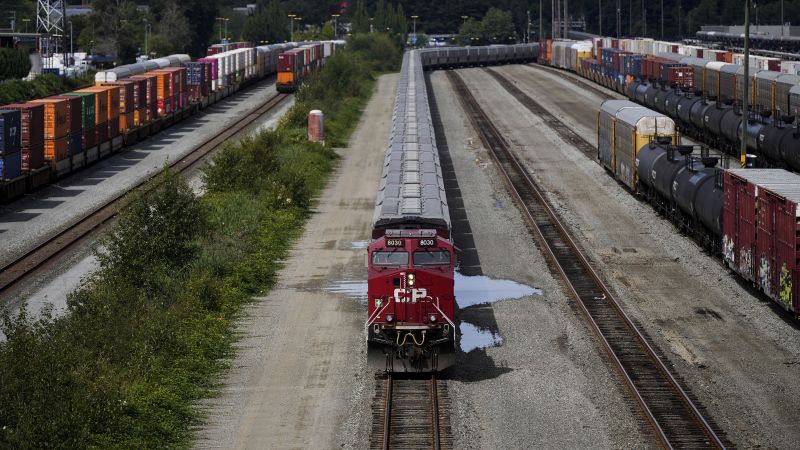New York CNN —
Canada’s two biggest freight rail companies have suspended operations, executives at both companies say, locking out 9,000 members of the Teamsters union that runs the trains and potentially dealing a blow to both the Canadian and U.S. economies.
About a third of the freight handled by the two railroads, Canadian National Railway (CN) and Canadian Pacific Kansas City Southern Railway (CPKC), crosses the U.S.-Canada border, and depending on how long the shutdown lasts, it could disrupt operations in many U.S. industries, including agriculture, autos, homebuilding and energy.
“CPKC is acting to protect Canada’s supply chain and all stakeholders from further uncertainty and broader disruptions that could result if this dispute drags on further and leads to potential work stoppages during peak fall shipping periods,” the company said in a statement Thursday, shortly after the lockout began at 12:01 a.m. ET. “Delaying the resolution of this labor dispute will only make things worse.”
The closure will be a reminder of how closely intertwined the two economies are, with many industries relying on the free movement of goods across the border to operate efficiently.
For example, some U.S. auto plants could be temporarily shut down if Canadian factories can’t make engines, transmissions and stampings, U.S. farmers could face fertilizer shortages, and U.S. water treatment plants near the Canadian border could run out of the chlorine they use to purify water.
This is the first time that Canada’s two biggest railroads have simultaneously been shut down due to labour disputes. The most recent strike in the industry was a 60-hour strike at Canadian Pacific Railway in 2022. Prior to that, there was a nine-day strike at Canadian National Railway in 2019.
Thursday’s action is not a strike, where union members refuse to show up to work, as management would tell the roughly 9,000 members they can’t work.
CPKC spokesman Patrick Waldron said it would be better for the union to stop work and reach a conclusion now rather than staging a strike later this fall.
“We are just around the corner from the peak fall shipping season. New Canadian grain crops are coming in and for the first time in two years we are not impacted by the drought,” Waldron told CNN before the lockout. “Containers loaded with Christmas gifts are arriving at our ports. If this extends into the fall shipping season, the results will be even worse.”
The Teamsters union is seeking a contract that works for both sides, but says the railroad’s demands would reduce rest periods and increase safety risks.
“Throughout this process, CN and CPKC have demonstrated their willingness to sacrifice rail safety and rip families apart to make extra money. The rail companies don’t care about farmers, small businesses, their supply chains or their own employees. Their only concern is increasing profits, even if it means putting the entire economy at risk,” Paul Boucher, president of the Canadian Railway Congress Teamsters, said in a statement early Thursday.
But the railroads deny that the reforms they are seeking would increase safety risks, arguing that all of their proposals provide stronger safety protections than those required under recently strengthened Canadian regulations.
Both companies blamed the union for failing to reach an agreement in time. They have asked the government to step in and submit the dispute to binding arbitration, but the government has so far refused.
This is a developing story and will be updated.



